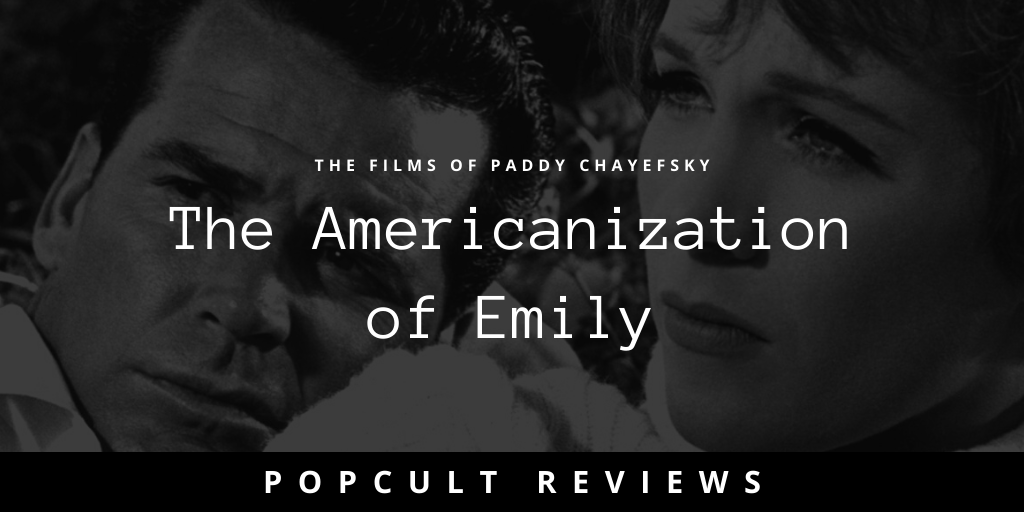
The Americanization of Emily (1964)
Written by Paddy Chayefsky
Directed by Arthur Hiller
You didn’t see a lot of films in the wake of World War II that called military action into question. You would see a slew of anti-war films twenty-odd years out from Vietnam. But on the twentieth anniversary of D-Day, it was a pretty bold move to put out a movie about the lead up to that event, which questioned the leadership of the U.S. military and spoke to how soldiers’ bodies are so often used as props for state-sanctioned propaganda. This material had to be couched inside a romantic comedy-drama, and the subversiveness is hidden deeper in the narrative after we’ve been given a seemingly light set-up.
Lt. Commander Charlie Madison (James Garner) works for the U.S. Naval Reserve as a “dog-robber” for Rear Admiral Jessup (Melvyn Douglas). A dog-robber was someone who could finagle and charm piles of goods and favors for their superior officer. Charlie us stationed in London and meets motor pool driver Emily (Julie Andrews), who is immediately turned off by his cocky, American attitude. She has lost every male member of her family and her husband to the World Wars but feels conflicted about whether or not to support throwing more people into the war machine’s teeth. Charlie reveals he is a pacifist which is why he jockeyed to get a non-combat position and proudly declares himself a coward.
Things change when Jessup, having a nervous breakdown, demands that he wants a Tomb of the Unknown Sailor and that the first dead soldier on Omaha Beach should be a Navy man. He commissions a film to be made of this act, Navy engineers going in ahead of ground forces to disable mines and clear the way. Charlie voices his dissent and has his friend Commander Cummings (James Coburn) order him to lead the film crew. Charlie must figure out how to endure what’s been put on his shoulders while still adhering to his personal beliefs of pacifism, seeing the propaganda film he’s to make as wholly against his ideals.
Paddy Chayefsky is the anti-thesis of Aaron Sorkin. Whereas Sorkin creates ideologies as characters, Chayefksy fashions characters with ideologies. Both writers have a lot of dialogue, but when you start to get to the root of what is being said, you find one, Sorkin lacks substance while Chayefksy is overflowing with nuance & complexity. Sorkin believes that institutions and decorum are hallmarks of a cogent society. Chayefsky sees these systems are rotten through the core with corruption and exploitation, propaganda machines manufacturing consent. Through Jessup’s insane ramblings, we see how the “glory of the Navy” is something artificial, constructed through the blood sacrifice of soldiers caught on film.
Charlie has gives a pointed remark during a speech to Emily’s mother that “It’s not war that’s insane; it’s the morality of it it.” Conflicts between people and societies are a perfectly natural occurrence, and even that escalate to violence is something that just happens. Charlie’s chief complaint is the attempt of nations using media to justify their actions as a pure & righteous crusade. I look to the W. Bush-era wars where soldiers were killed to expand Western capitalism into the Middle East. Pizza Hut and McDonald’s were some of the first “boots on the ground” when the nation of Iraq was taken. All of this was couched in empty platitudes of “spreading freedom & Democracy.” Charlie would argue that while it’s good to defeat Sadaam, don’t kid yourself that the war is a mission to free the people of Iraq.
There are many moments where the film veers into frivolousness, trying to balance the powerful themes with the personal love story. I don’t think the final product was well-balanced, yet it is still an incredibly unique picture well worth watching. There are some cringe-inducing elements of 1960s sexism that just doesn’t fly today and honestly wasn’t acceptable then. But Chayefsky can present a unique perspective of pacifism where cowardice is a sign of strength in decreasing the brutality of humans in war.

2 thoughts on “Movie Review – The Americanization of Emily”